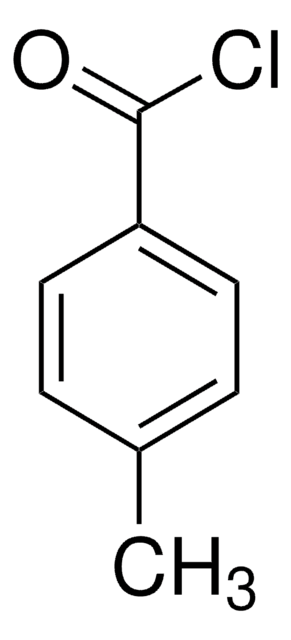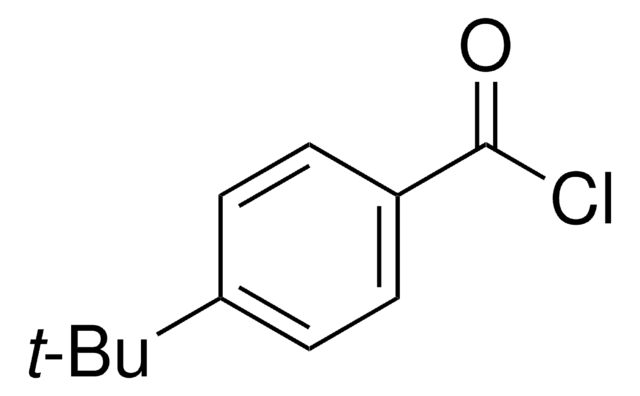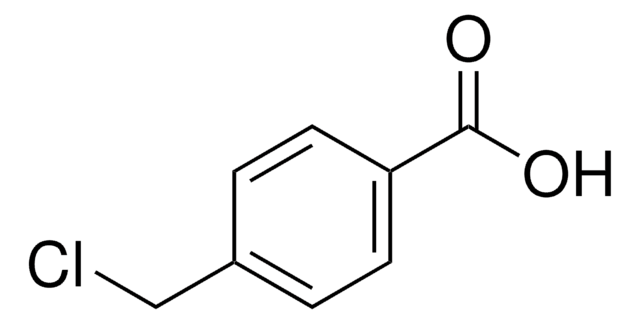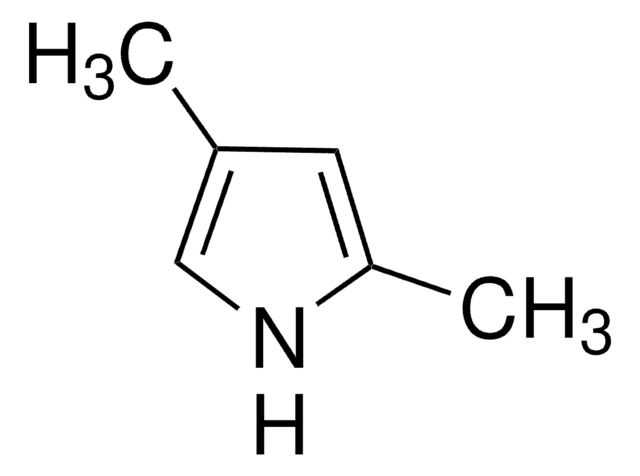All Photos(2)
About This Item
Linear Formula:
ClCH2C6H4COCl
CAS Number:
Molecular Weight:
189.04
EC Number:
MDL number:
UNSPSC Code:
12352100
PubChem Substance ID:
NACRES:
NA.22
Recommended Products
Quality Level
Assay
97%
bp
126-128 °C/6 mmHg (lit.)
mp
30-32 °C (lit.)
SMILES string
ClCc1ccc(cc1)C(Cl)=O
InChI
1S/C8H6Cl2O/c9-5-6-1-3-7(4-2-6)8(10)11/h1-4H,5H2
InChI key
RCOVTJVRTZGSBP-UHFFFAOYSA-N
Related Categories
Application
4-(Chloromethyl)benzoyl chloride was used as an atom transfer radical polymerization (ATRP) initiator in the growth of polyacrylamide (PAAm) brushes from silicon wafers. It was also used as a building block in a microwave-assisted, solid-phase synthesis of imatinib, an anticancer agent.
Signal Word
Danger
Hazard Statements
Precautionary Statements
Hazard Classifications
Eye Dam. 1 - Skin Corr. 1B - STOT SE 3
Target Organs
Respiratory system
Storage Class Code
8A - Combustible corrosive hazardous materials
WGK
WGK 3
Flash Point(F)
199.4 °F - closed cup
Flash Point(C)
93 °C - closed cup
Personal Protective Equipment
dust mask type N95 (US), Eyeshields, Gloves
Certificates of Analysis (COA)
Search for Certificates of Analysis (COA) by entering the products Lot/Batch Number. Lot and Batch Numbers can be found on a product’s label following the words ‘Lot’ or ‘Batch’.
Already Own This Product?
Find documentation for the products that you have recently purchased in the Document Library.
Customers Also Viewed
Irina Cringus-Fundeanu et al.
Langmuir : the ACS journal of surfaces and colloids, 23(9), 5120-5126 (2007-03-29)
A method is presented to prevent microbial adhesion to solid surfaces exploiting the unique properties of polymer brushes. Polyacrylamide (PAAm) brushes were grown from silicon wafers by atom transfer radical polymerization (ATRP) using a three-step reaction procedure consisting of immobilization
Ali Bilgic et al.
Journal of fluorescence, 30(4), 867-881 (2020-06-05)
In this study, we developed two different very sensitive magnetite fluorescent Fe3O4@SiO2-TPED-BODIPY and Fe3O4@SiO2-TMPTA-BODIPY nano-sensors for the selective detection of Cr(VI) ions. The Cr(VI) metal ions sensing is based on the fluorescent quenching of BODIPY functionalized with Fe3O4@SiO2-TPED and Fe3O4@SiO2-TMPTA
Tetrahedron Letters, 48, 3455-3455 (2007)
Song Yi Lee et al.
ACS applied materials & interfaces, 10(43), 36628-36640 (2018-10-10)
CD44 receptor targeting and lipid rafts destroying nanoassembly (NA) was developed for breast cancer therapy. Methyl-β-cyclodextrin (MbCD), as a cholesterol depletion moiety, was conjugated to hyaluronic acid-ceramide (HACE) structure via an ester linkage. HACE-MbCD NA with 198 nm hydrodynamic size
Aleksander Promiński et al.
Materials (Basel, Switzerland), 13(4) (2020-02-23)
Achieving remotely controlled, reversibly reconfigurable assemblies of plasmonic nanoparticles is a prerequisite for the development of future photonic technologies. Here, we obtained a series of gold-nanoparticle-based materials which exhibit long-range order, and which are controlled with light or thermal stimuli.
Our team of scientists has experience in all areas of research including Life Science, Material Science, Chemical Synthesis, Chromatography, Analytical and many others.
Contact Technical Service















